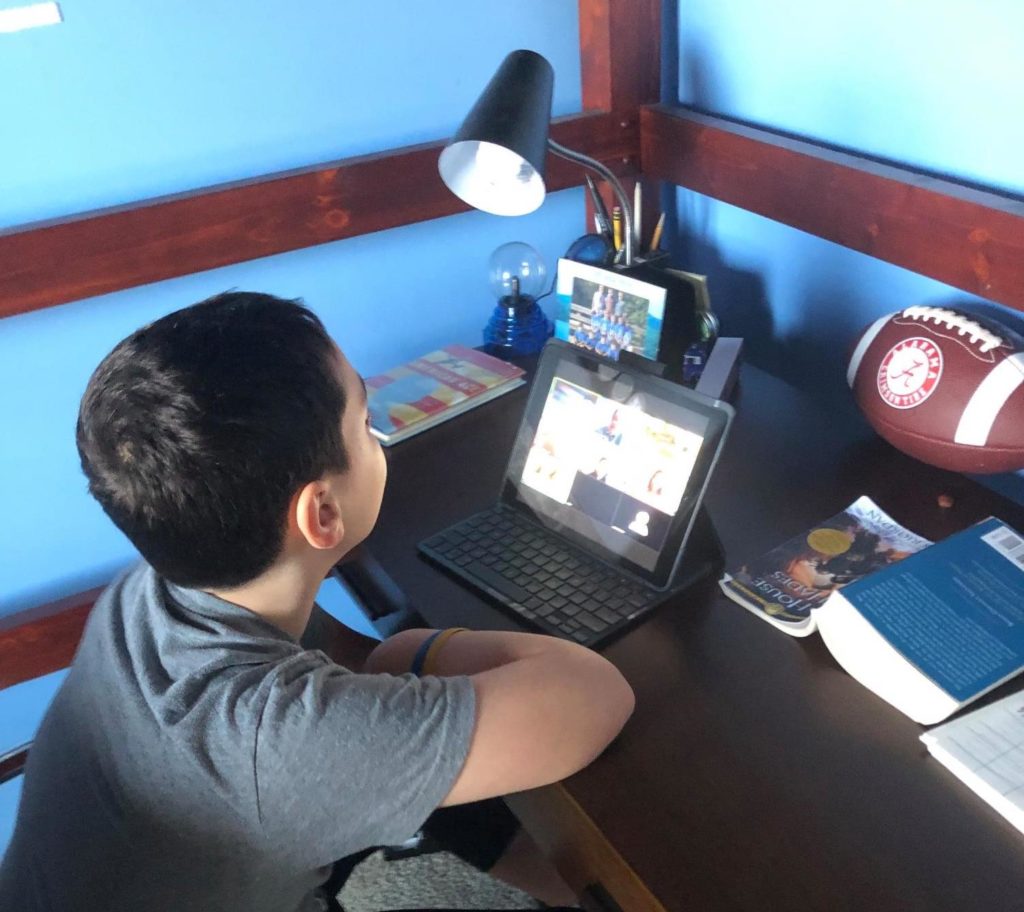
The stresses of virtual learning won’t disappear for Nashville parents once the school year begins on Tuesday. The process of figuring out how to make the best of this new learning model comes with many hurdles for local families.
“I am now struggling to find a solution to my son needing to be at home,” says Lauren Presley, a mom of three and local health care professional.
Presley is one of the many parents on the bubble about what to do as schools reopen. Next week, her son will begin online classes at Glendale Elementary, a Metro Nashville Public School in Oak Hill.
He’s a part of the unique group of students that will begin kindergarten in an all-virtual setting, which will be chaotic to manage during the week. Presley says she’ll probably hire a tutor to help manage his schedule, but that it’s far from an adequate solution. She says she’ll also have to figure out a way to address his emotional needs.
“That’s just another piece of the puzzle,” says Presley. “You have kids that are struggling mentally at home [and] are not doing well in a non-structured setting.”
The district acknowledges this concern. Officials say they’ll be resorting to telehealth counseling services for students who need them, as well as providing social-emotional supports.
“Any slide or decline in the socialization of kids — their resilience, grit, behaviors, attitudes, development of time management, personal relationship skills with their family members, with their friends — those are also things that we share a concern about that might be adversely impacted by the extended school closure,” says David Williams, the executive officer for teaching and learning at Metro Schools.
But then there’s the question of whether virtual learning will be effective.
“I am concerned about the learning gaps,” says Alison Black, a parent at Eakin Elementary in Hillsboro Village. “I think a lot of people are, and they should be because we saw what happened.”
Black says she hasn’t yet hired a personal tutor but has paid for extra help from websites like Kickstart Reading, in addition to utilizing a range of free resources, to supplement her daughter’s education since the spring school closures.
She’ll likely do the same come August. She’s even weighed her options for private school — although spending the extra cash isn’t ideal for her budget.
“Right now I could afford that, but how long can I sustain it?” says Black.
Like many parents, Black’s household is sort of in a middle-class gray area. She can neither be put at the front of the line for low-wage resources, nor spend part of her income without long-term consequences.
Black says Metro Schools got off to a bad start when they were blindsided by the pandemic in the spring. She had to take it upon herself to keep her daughter engaged, while the district scrambled to figure out a remote learning plan.
“Remote Learning and Remote Learning 2.0 were bad. I don’t know any MNPS parents that found the virtual instruction adequate,” says Black. “This is especially true for K-2 students who did not receive access to district devices. We spent so much money on ink for printouts. We are not teachers. We are working parents.”
But at this point, Metro Schools has contracted with the Florida Virtual School, which is overseen by the Florida Department of Education. Although some parents are still leery about virtual learning, district leaders say they’re confident they’ll be able to meet the needs of all students.
As of Tuesday, the district identified 17,000 students with technology needs, and have prepped 19,000 devices for delivery. This is in addition to the 10,000 laptops handed out in the spring. They plan to distribute 17,000 hotspots for families without internet access, too.
“The spring, as you know, we were confronted with the declaration of the pandemic, trying to provide and continuing to provide instructional opportunities for kids,” says Williams. “We did that through an unstructured and more of an informal approach.”
Williams says the district spent the summer developing a more structured learning plan for the fall. He also says district leaders are actively monitoring the effectiveness of their distance learning rollout — along with developing plans to address student learning loss.
“What we’re expecting to do is quickly identify and shore up some of those skills gaps and academic learning gaps that they may have experienced over this extended school closure,” says Williams. “And then figure out a way that we can fill those gaps as we introduce new grade level-content.”

